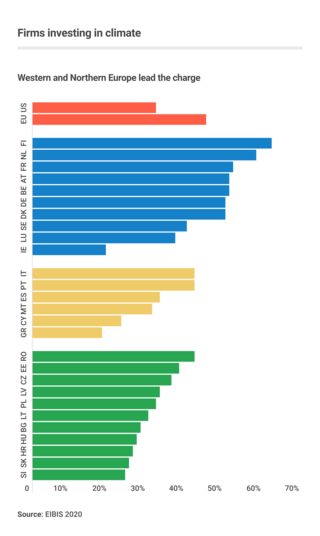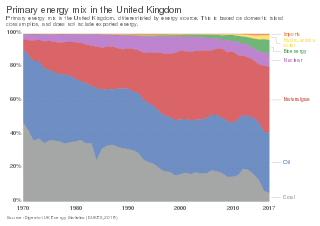
The International Energy Agency (IEA) is a Paris-based autonomous intergovernmental organization, established in 1974, that provides policy recommendations, analysis and data on the global energy sector. The 31 member countries and 13 association countries of the IEA represent 75% of global energy demand.

David Thomas Bronconnier is a Canadian politician who served as the 35th Mayor of Calgary, Alberta.
The United Kingdom's Climate Change Programme was launched in November 2000 by the British government in response to its commitment agreed at the 1992 United Nations Conference on Environment and Development (UNCED). The 2000 programme was updated in March 2006 following a review launched in September 2004.

Business action on climate change is a topic which since 2000 includes a range of activities relating to climate change, and to influencing political decisions on climate change-related regulation, such as the Kyoto Protocol. Major multinationals have played and to some extent continue to play a significant role in the politics of climate change, especially in the United States, through lobbying of government and funding of climate change deniers. Business also plays a key role in the mitigation of climate change, through decisions to invest in researching and implementing new energy technologies and energy efficiency measures.

A Zero-Energy Building (ZEB), also known as a Net Zero-Energy (NZE) building, is a building with net zero energy consumption, meaning the total amount of energy used by the building on an annual basis is equal to the amount of renewable energy created on the site or in other definitions by renewable energy sources offsite, using technology such as heat pumps, high efficiency windows and insulation, and solar panels.
Various energy conservation measures are taken in the United Kingdom.

The energy policy of the United Kingdom refers to the United Kingdom's efforts towards reducing energy intensity, reducing energy poverty, and maintaining energy supply reliability. The United Kingdom has had success in this, though energy intensity remains high. There is an ambitious goal to reduce carbon dioxide emissions in future years, but it is unclear whether the programmes in place are sufficient to achieve this objective. Regarding energy self-sufficiency, UK policy does not address this issue, other than to concede historic energy security is currently ceasing to exist.

Energy Alberta Corporation was created in 2005 with a concept to provide nuclear power to the energy-intensive development of the oil sands resources in northern Alberta, Canada. The company was founded by Hank Swartout, CEO of Precision Drilling Corporation, and Wayne Henuset, co-owner of Willow Park Wines and Spirits in Calgary, Alberta. The company intended to build a nuclear plant on the shore of Lac Cardinal, 30 kilometres (19 mi) from Peace River, Alberta.

The energy policy of the European Union focuses on energy security, sustainability, and integrating the energy markets of member states. An increasingly important part of it is climate policy. A key energy policy adopted in 2009 is the 20/20/20 objectives, binding for all EU Member States. The target involved increasing the share of renewable energy in its final energy use to 20%, reduce greenhouse gases by 20% and increase energy efficiency by 20%. After this target was met, new targets for 2030 were set at a 55% reduction of greenhouse gas emissions by 2030 as part of the European Green Deal. After the Russian invasion of Ukraine, the EU's energy policy turned more towards energy security in their REPowerEU policy package, which boosts both renewable deployment and fossil fuel infrastructure for alternative suppliers.
Energy Saving Trust is a British organization devoted to promoting energy efficiency, energy conservation, and the sustainable use of energy, thereby reducing carbon dioxide emissions and helping to prevent man-made climate change. It was founded in the United Kingdom as a government-sponsored initiative in 1992, following the global Earth Summit.

Canada has access to all main sources of energy including oil and gas, coal, hydropower, biomass, solar, geothermal, wind, marine and nuclear. It is the world's second largest producer of uranium, third largest producer of hydro-electricity, fourth largest natural gas producer, and the fifth largest producer of crude oil. In 2006, only Russia, the People's Republic of China, the United States and Saudi Arabia produce more total energy than Canada.

The United States produced 5.2 billion metric tons of carbon dioxide equivalent greenhouse gas (GHG) emissions in 2020, the second largest in the world after greenhouse gas emissions by China and among the countries with the highest greenhouse gas emissions per person. In 2019 China is estimated to have emitted 27% of world GHG, followed by the United States with 11%, then India with 6.6%. In total the United States has emitted a quarter of world GHG, more than any other country. Annual emissions are over 15 tons per person and, amongst the top eight emitters, is the highest country by greenhouse gas emissions per person.

Efficient energy use, or energy efficiency, is the process of reducing the amount of energy required to provide products and services. There are many technologies and methods available that are more energy efficient than conventional systems. For example, insulating a building allows it to use less heating and cooling energy while still maintaining a comfortable temperature. Another method is to remove energy subsidies that promote high energy consumption and inefficient energy use. Improved energy efficiency in buildings, industrial processes and transportation could reduce the world's energy needs in 2050 by one third.
Post-Kyoto negotiations refers to high level talks attempting to address global warming by limiting greenhouse gas emissions. Generally part of the United Nations Framework Convention on Climate Change (UNFCCC), these talks concern the period after the first "commitment period" of the Kyoto Protocol, which expired at the end of 2012. Negotiations have been mandated by the adoption of the Bali Road Map and Decision 1/CP.13.

Despite abundant natural resources and a relatively small population, New Zealand is a net importer of energy, in the form of petroleum products. The ratio of non-renewable and renewable energy sources was fairly consistent from 1975 to 2008, with about 70 per cent of primary energy supply coming from hydrocarbon fuels. This ratio decreased to about 60 per cent in 2018. The proportion of non-renewable energy varies annually, depending on water flows into hydro-electricity lakes and demand for energy. In 2018, approximately 60% of primary energy was from non-renewable hydrocarbon fuels and 40% was from renewable sources. In 2007 energy consumption per capita was 120 gigajoules. Per capita energy consumption had increased 8 per cent since 1998. New Zealand uses more energy per capita than 17 of 30 OECD countries. New Zealand is one of 13 OECD countries that does not operate nuclear power stations.

Energy laws govern the use and taxation of energy, both renewable and non-renewable. These laws are the primary authorities related to energy. In contrast, energy policy refers to the policy and politics of energy.

Renewable energy in Canada represented 17.3% of the Total Energy Supply (TES) in 2020, following natural gas at 39.1% and oil at 32.7% of the TES.

The Energiewende is the ongoing energy transition by Germany. The new system intends to rely heavily on renewable energy, energy efficiency, and energy demand management.
The Canadian province of Alberta faces a number of environmental issues related to natural resource extraction—including oil and gas industry with its oil sands—endangered species, melting glaciers in banff, floods and droughts, wildfires, and global climate change. While the oil and gas industries generates substantial economic wealth, the Athabasca oil sands, which are situated almost entirely in Alberta, are the "fourth most carbon intensive on the planet behind Algeria, Venezuela and Cameroon" according to an August 8, 2018 article in the American Association for the Advancement of Science's journal Science. This article details some of the environmental issues including past ecological disasters in Alberta and describes some of the efforts at the municipal, provincial and federal level to mitigate the risks and impacts.
ASEAN Center for Energy (ACE) is an intergovernmental organisation within the structure of the Association of Southeast Asian Nations (ASEAN). Its mission is to 'accelerate the integration of energy strategies within ASEAN by providing relevant information and expertise to ensure the necessary energy policies and programmes are in harmony with the region’s economic growth and environmental sustainability.' Dr. Nuki Agya Utama serves as Executive Director.














